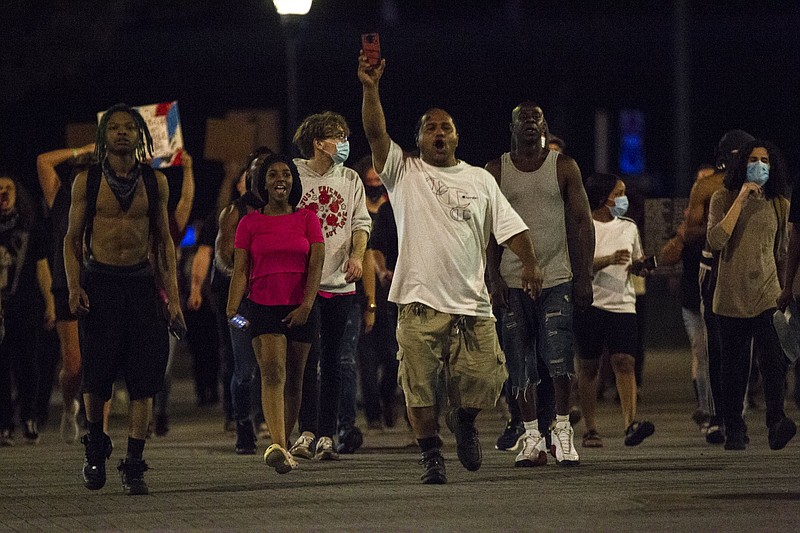A list of any group's "demands" usually lands with a loud thud on the desks of officials with overall responsibility simply because of the pejorative nature of the word "demands."
"Demands," after all, carries with it an implied threat, as in if our demands aren't met, this or that will happen.
We don't know what threats are implied by of a coalition of protesting groups that shared their "demands" about local law enforcement, prisons and governance with the Times Free Press Saturday. But it will be interesting to see how deeply Mayor Andy Berke, the Chattanooga City Council and Police Chief David Roddy will consider the demands, and whether they will be substantially acted on.
The seven demands are a mixed bag of requests that either are already happening, are worth consideration or are unlikely ever to happen.
The No. 1 demand from the coalition, which includes the groups #ICantBreatheCHA, Concerned Citizens for Justice, The Unity Group, the African American Women's Coalition and the Community Haven Chattanooga, is to "divest from the police department budget and reinvest into black and brown communities."
This request cannot be seriously considered as there are legitimate and ongoing needs for public safety services. Imagine, for instance, if police weren't available to arrest two men with assault rifles last week among Chattanooga protesters rallying against the death of suspect George Floyd while he was pinned down by a Minneapolis police officer. The potential loss of life would have been staggering.
City Councilman Erskine Oglesby told a news conference of black elected officials of the practical impossibility last week, saying defunding the department is "not an option."
Over the weekend, national media attempted to temper cries around the country to "divest" law enforcement agencies by suggesting to frightened Americans that divesting from departments did not mean the same thing as defunding it. However, according to the local demands, defund actually means defunding the $71.9 million police budget (28% of the city's budget), or at least more than half of it.
Although the coalition may have been serious about the request, we don't believe Berke, Roddy, the city council or Chattanoogans in general believe this is an option.
Another demand that is reasonable in almost all occasions is instituting "a warning before shooting policy." Indeed, such a policy has been Chattanooga Police Department (CPD) policy for more than 20 years. However, the CPD uses the term "where feasible," meaning there may be rare opportunities when an officer is shot at and such a warning may not be possible.
We were intrigued, though, by the demand to institute a "duty to intervene" policy. The CPD updated its code Monday to say "each department member has the individual responsibility to intervene and stop any other member from committing an unlawful or improper act, including but not limited to, acts of brutality, abuses of process, abuses of authority, and any other criminal acts or major violations of department rules and procedures." We commend the police for making this change.
Fortunately, three of the demands - investment in engagement of youth by the development of programs, improving public transportation through CARTA that includes technology, security and access, and further police training/vetting - are already occurring.
As to youth, the Department of Youth and Family Development is budgeted for $11.1 million in the next fiscal year, and officials there are constantly attempting to hone their operations to reach more youth and reach them in new ways.
About CARTA, the transportation authority must balance ridership with costs. Nevertheless, we would like to know that CARTA is constantly re-examining its routes and service areas in an attempt to serve the most people in the most cost effective way.
On police training/vetting, we know a considerable amount in the police budget - more than $2.2 million in fiscal 2021 - is spent on both. Certainly, if the coalition is aware of specific helpful training or vetting techniques the department is not aware of, we're sure Roddy would be happy to hear of them.
The seventh "demand" is for "prison reform" and "releases." Fortunately, sentencing reform already is occurring at the national, state and local levels and is likely to continue. But the mayor, the city council and Roddy do not have any authority to summarily change anything to do with sentences meted out following convictions for crimes or how soon those who are convicted are released.
And it sounds simple to suggest releasing anyone convicted of "non-violent or victimless crimes," but the actual charge and convicted individual's record are just two factors among many that must be considered before release.
We're sure that coalition members spent considerable time forming their "demands," and we hope the groups involved will follow up with the agencies who are already implementing some of what they have suggested. Collaboration, after all, is much preferable to "demands."
